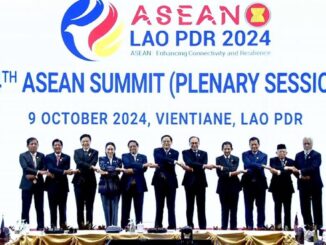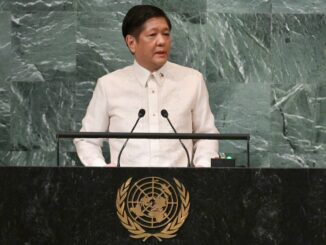
A war crimes case against Myanmar’s junta officials awaits action in the Philippines. Will Marcos respond like the human rights champion he says he is?
MANILA, Philippines — President Ferdinand Marcos Jr. this week joined other Southeast Asian leaders in a high-level sit-down to renew its calls to end the protracted civil war in Myanmar, with the Philippine leader saying “new strategies” are needed to address the conflict.
ASEAN leaders, including Marcos, have admitted the bloc’s peace deal with the Myanmar junta, signed just weeks after the 2021 coup, has failed to provide a lasting solution to the years-long violence that has displaced millions.
But this month also marks nearly a year since five displaced members of Myanmar’s Chin community filed a landmark war crimes case against junta officials in the Philippines. The case rests on the principle of universal jurisdiction, which they say allows them to hold their country’s human rights violators accountable in a court outside of Myanmar.
In a February letter, the Department of Justice shot down the complaint and said it falls outside of Philippine jurisdiction. A motion of reconsideration filed in response to the letter said the complaint did not even reach the dockets.
For one of the group’s Filipino legal representatives, the case is an opportunity for the Philippine justice system — and by extension — the president, to step in where ASEAN’s negotiated solution has faltered.
“ASEAN needs to put up an institution or mechanism for accountability with regard to what’s happening in Myanmar. We think that action in the Philippines can be a foundation for that mechanism in the long run,” said Romel Bagares, international law professor and one of the lawyers representing the Chin minority group.
The pursuit of justice for the atrocities committed by the Myanmar junta against the Christian minority group is a “case of accountability for impunity” in Southeast Asia, Bagares told Philstar.com in an interview.
“To start the process, we can begin with the Philippines.”
Devastation of ‘Biblical proportions’
Represented by Filipino lawyers, five Chin individuals in October 2023 sued ten high-ranking junta officials, including the top junta chief Senior Gen. Min Aung Hlaing. They accused the military regime of committing grave human rights abuses against the Chin community since the ouster of Myanmar’s democratically elected government in 2021.
The allegations include the murder of civilians, mutilation of bodies, arson of hundreds of homes, destruction of churches, and the weaponization of humanitarian aid.
For Salai Ling, one of the complainants, the junta’s abuses against minority Christians like him are “apocalyptic” and unprecedented in history, especially as the Chin State was one of the most impoverished in Myanmar even before the coup.
“We have literally half of the population displaced in a matter of four years,” said Salai Ling, who is also the deputy executive director of the Chin Human Rights Organization.
“We have not even begun to reel back from the devastating effects of the COVID-19 pandemic when the junta launched an all-out military assault on our land and unleashed unimaginable atrocities against our people,” Salai Ling told Philstar.com.
“They destroyed everything in their paths, razed the villages, destroyed livelihoods, arrested, tortured and killed civilians and combatants alike, and forced relocated communities and forced them into exile,” he said. “It is a devastation of Biblical proportions.”
The group, Bagares said, is undeterred by the justice department’s rejection of their complaint. They have already filed a motion for reconsideration and have been on an uncertain months-long wait for action on the case.
A copy of the motion for reconsideration as seen by Philstar.com assails the justice department for not even docketing the complaint, which it said should have been a routine and ministerial step. It points out that returning the undocketed complaint is irregular and violates established rules.
The motion also argues that the February letter confirmed there was enough evidence to start a preliminary investigation because the allegations involve war crimes under Philippine law.
“This case is noble for that reason. We expect all sorts of challenges to be lodged in the way of a complaint like this. But we think that we have strong grounds for invoking universal jurisdiction based on our study of international humanitarian law that we have in the Philippines,” Bagares said.
Why the Philippines? Bagares cites Republic Act 9851 or the Philippine Act on Crimes Against International Humanitarian Law, Genocide, and Other Crimes Against Humanity as being of sufficient basis to try those accused of war crimes.
The international law explained that the Philippines has a long history of prosecuting war crimes, with an established law and a judicial tradition that dates back to post-World War II. This includes successful prosecutions related to the Marawi and Zamboanga sieges, which invoked RA 9851.
Human rights tradition. Both Bagares and Salai Ling also cited the Philippines’ old reputation of being a human rights champion on the international stage — a view that would sharply drop during the Duterte administration and his launch of a deadly war on drugs. “We used to be the darling of the human rights community when it comes to atrocities and crimes… [But] as you know, the last administration brought us so low,” Bagares said.
The international law expert pointed out that the current Marcos administration is, contrary to its original position, now more open to the idea of holding Duterte accountable for rampant human rights violations committed during the drug war.
Marcos has, as several observers pointed out, constantly framed himself as a human rights champion during his overseas tours even as his government has kept Duterte’s drug war going. Hostilities with the Duterte family this year have seen Marcos’ allies in Congress change their tune and, for the first time, seek answers to the abuses during Duterte’s presidency.
RELATED: Marcos’ ‘ambitious’ UN plans hinged on fixing PH human rights issues — UN expert | Rights groups refute Marcos’ claim of ‘progress’ in ending drug war abuses
“I think that it will become inevitable that the government will answer to the demands of international accountability concerning the drug war,” Bagares said.
“And if the government is going to accept a role in pursuing international accountability with respect to the drug war, then it should not be a problem for the Philippines… to take a stronger role on the Myanmar crisis,” he added.
With ASEAN largely unable to rein in the junta’s continued abuses, Bagares said: “Our action in the Philippines is something that can spur a regional mechanism.”
RELATED: ASEAN needs ‘new strategies’ to rein in Myanmar violence, says Marcos
Marcos’ response—or lack thereof—to the complaint of the Myanmar junta’s victims will test how serious he is about his pronouncements in the international arena that the Philipines is “ready to take the mantle for human rights,” Bagares said.
Salai Ling is banking on the Philippines’ reputation as “one of the most democratic countries in the region” to act on their case, especially with its upcoming chairpersonship of the ASEAN bloc in 2026.
“We believe that President Ferdinand Marcos Jr. has a special interest in providing a leadership that engages the global community with pride and deeds, and not with a conscience that keeps your head down for having failed to protect human rights, prevent atrocities and injustices in our own backyards,” Salai Ling said.
“The president can start providing the groundwork by supporting initiatives that have been started on Philippines soil that seek justice and accountability in Myanmar, to hold its military junta accountable for international crimes,” he added.





Be the first to comment